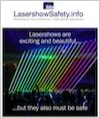About IDN (ILDA Digital Network)
The ILDA Digital Network is a collection of standards intended to help transfer laser show data between show-producing software, playback devices, projectors, and laser signal recorders.
IDN is not a product that you can buy, or even a schematic you can download. It is a series of high-level open standards. Any ILDA Member, and even some non-members, can help develop this open standard system. Any person or company can download and implement the IDN standards in their equipment.
IDN is not intended to replace the proprietary networking standards developed by laser companies. Instead it complements them, because IDN is open. If and when IDN is widely implemented, it will allow users to more seamlessly use one company's software or controller on another company's projector.
In this way it is similar to the successful 1990's ILDA laser signal standard that came up with the DB-25 "ILDA" connector. This connector is widely available on controllers and projectors today. That's how so many different control systems can work with so many different projectors.
No one is forced to use the IDN standard — just like 1990's manufacturers could have stayed with their own proprietary laser signal connectors.
But if IDN has some success, over time there may be more and more persons who see the benefit of an industry-wide open networking standard.
ILDA Digital Network resources
ILDA's Technical standards page contains official and proposed IDN standards. (Scroll down to the section listing the various IDN standards.)
The ILDA Technical Committee has a separate website with resources about the IDN. As of March 2021 it contains the following sections:
- Commercial Products — Software systems, Plugins and drivers, Turnkey products, Hardware. Note: These are non-ILDA third-party products. ILDA is a non-profit trade association that does not make, sell or receive royalties from products.
- Integration - OEM components
- Projects - Platforms, Tools, Source code and libraries
- Documentation - link back to the ILDA Technical standards page
A general overview of IDN is in the document Understanding IDN Wireshark Traces. It is best for persons familiar with Wireshark. (The source document is kept here; if it is updated, the update will be at that link.)
Tim Walsh has created a Zip file that contains tutorials and sample files for users of the DexLogic programs "Parsec" and "Netview." Parsec is used for IDN recording and playback.
There is a monthly Zoom meeting, open to all interested in IDN. Find out more, give us feedback and suggestions. It is usually the last Thursday of each month. To get on the mailing list of monthly Zoom notices, contact ILDA.
Because the standard continues to evolve, please contact ILDA if you do not find the information you want or need. We may have it already or we may be able to add it.
Below is an overview of IDN as an open standard.
-
IDN - An open standard
Information from ILDA Technical Committee chair Dirk Apitz, February 2017
IDN is an open standard. There is a publicly available document describing it. It was developed in the ILDA technical committee - and voted on and adopted by the ILDA membership in Dubai 2015. Opposed to an open standard like this there are proprietary implementations. These are usually secrets of people or companies. Best you can get there is access by signing NDAs (Non-Disclosure Agreements).
This might not bother you as long as everything works fine, you're satisfied, features are sufficient and your relationship to the manufacturer is good. It turns into a headache, once something breaks though. You might find yourself in dreaming of other solutions, searching for workarounds or fooling yourself by glossing over the situation.
Even worse - how about a company closing down or being taken over or discontinuing a product? How about operating system upgrades/changes? How about changed business that leaves you in need of some special features that your setup doesn't provide? Or - how about you wanting to watch your old shows on future hardware - in - say 20 years from now?
But - stop - isn't it your time and inspiration that you put into your artwork, shows and programming? You're the owner - right? So - why is it that you can't just access it with different products to reach your goals and expectations?
Open standards allow for that. As an example - think of OpenOffice or pdf - or the Internet Protocol. There is more than one editor, viewer - or program in general being able to use these formats.
For more information, visit our other ILDA websites:
© 2007-2026 International Laser Display Association. All rights reserved.
Contact ILDA
No reproduction of the text or images on ILDA websites is allowed without written permission of ILDA or other copyright holders. "ILDA" and the ILDA logo are trademarks of the International Laser Display Association.
This site does not use cookies and does not track or gather information on individual visitors. Aggregate information is gathered by Google Analytics to determine overall visitor behavior. More information is on our Privacy Policy page.


